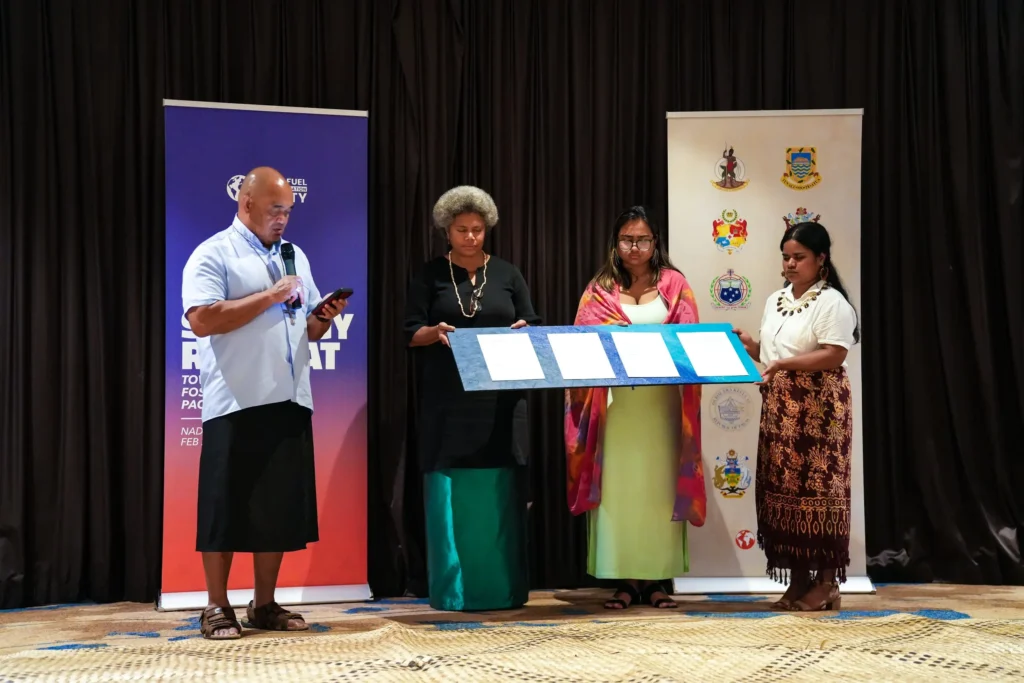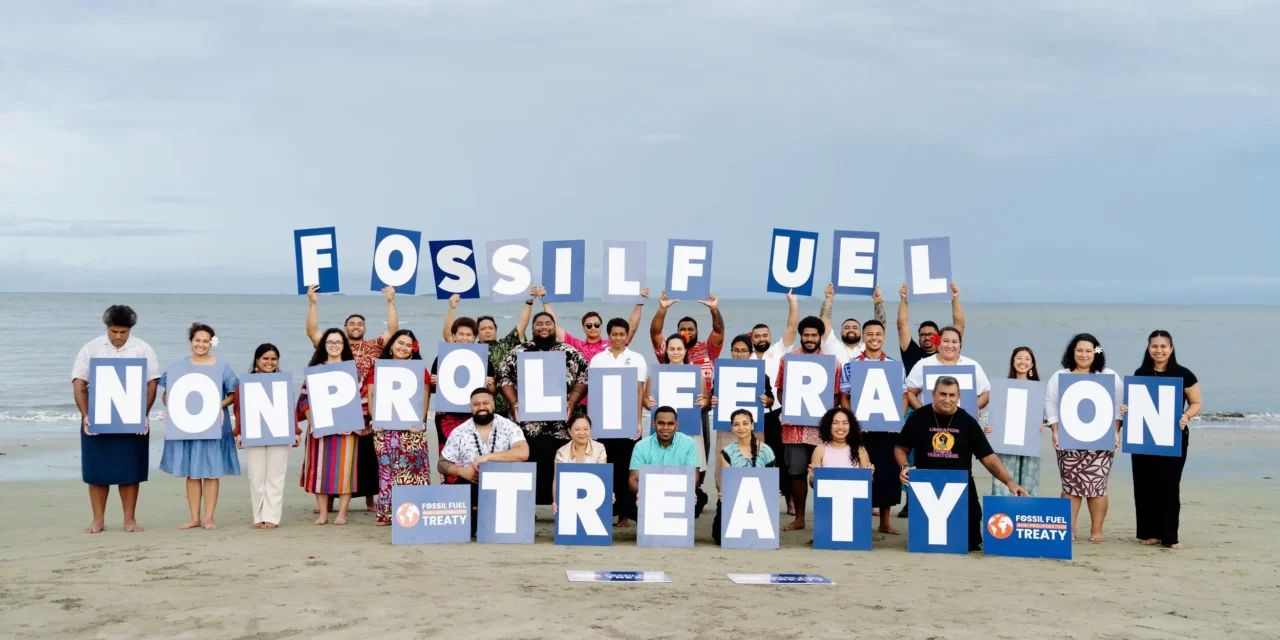The Naiuli Declaration, drafted by Pacific civil society organisations, along with faith, youth, and indigenous communities, represents a significant moment in the fight against climate change. It is the first declaration from a region’s civil society organisations to endorse the Fossil Fuel Non-Proliferation Treaty, a proposed international treaty that would halt the expansion of fossil fuels and accelerate a just transition to clean energy.The Naiuli Declaration outlines a series of demands, including:
* A commitment from the international community to accelerate the phase-out of fossil fuels and support a just transition for developing nations, through the development and negotiation of a binding global Fossil Fuel Non-Proliferation Treaty.
* An unequivocal commitment from Pacific leaders for a Just and Equitable Transition to a Fossil Fuel Free Pacific by COP30.
* Increased transparency on fossil fuel investments and projects.
* Urgent action to address the climate crisis, based on the best available science and the traditional knowledge of Indigenous Peoples.
The Naiuli Declaration draws inspiration from a rich legacy of climate leadership in the Pacific region. Previous declarations, like the Suva Climate Change Declaration (2015), the Boe Declaration (2018), and the Port Vila Call for a Just Transition to a Fossil Fuel Free Pacific (2023), all outlined ambitious goals and paved the way for this groundbreaking call for a Fossil Fuel Non-Proliferation Treaty.
Representatives of Pacific civil society organisations gathered in Nadi, Fiji for the Pacific Strategy Retreat, where they unveiled the Naiuli Declaration for a Fossil Fuel Non-Proliferation Treaty. (Photo: Voyager Pacific)
Joseph Sikulu, Pacific Regional Managing Director of 350.org, who presented the Naiuli Declaration at the Global Citizen NOW Action Summit in Melbourne, said:
“This climate crisis was created by decades and decades of corporations and governments working together to make legal the extraction, dispossession, and destruction of Indigenous land. And if we’re going to shift that, we need to challenge those laws and disrupt those frameworks. And one of the ways that we’re trying to do that was the Naiuli Declaration and the Fossil Fuel Non-Proliferation Treaty, by asking for what we want, and propositioning what it is we need from this world.”
Rev. James Bhagwan, steering committee member of the Fossil Fuel Non-Proliferation Treaty Initiative and General Secretary of the Pacific Conference of Churches (PCC), says:
“The Naiuli Declaration is not just a declaration. It’s the setting of an agenda for a Fossil Fuel Free Pacific. It is a manifesto. It is a vision that we have for our Pacific—one which thousands are joining around the world. Because the Pacific is taking a lead on this, it’s important we envisage what that could look like. And the Fossil Fuel Non-Proliferation Treaty is the way forward. It is a covenant for governments, for communities, and for creation.”
Hon. Lenora Qereqeretabua, Assistant Minister for Foreign Affairs of the Republic of Fiji, who received the declaration on behalf of the Fiji government, says:
“While our political leaders spearhead our collective efforts, we recognise and applaud the crucial role played by Pacific civil society. Your relentless pursuit of ambitious and innovative solutions continues to captivate global audiences—from the Pacific-led campaign for an Advisory Opinion from the International Court of Justice Advisory Opinion on Climate Change, to the Fossil Fuel Non-Proliferation Treaty—formally endorsed first by our Pacific Neighbours Vanuatu and Tuvalu. Tonight, having received this declaration, we weave these two strands of work—the political and civil society, creating a united and resounding voice. The Fiji Government reaffirms our support for the Port Vila Call for a Just Transition to a Fossil Fuel Free Pacific and in doing so, we join the chorus of voices advocating for the development of a Fossil Fuel Non-Proliferation Treaty, a commitment solidified at the UN talks in Bonn in June 2023.
We recognise Fossil Fuels as the primary driver of the climate crisis and the Fiji Government stands ready to lead, collaborate, and negotiate for the planet and for future generations—and we extend a hand in partnership acknowledging the urgency of this task and recognizing that genuine partnerships with civil society organisations are crucial for success.”
Archbishop Peter Loy Chong of Suva, Fiji, also delivered a speech during the event, saying:
“Policy and development is built on narrative. Australia is a big coal mining country and is already spreading its tentacles to influence the Pacific and what is going on here. So I’m really happy that the Naiuli Declaration is taking place here because we need to have the right narrative, and hold on to the truth so that our region and politicians are not dependent on other nations for the narrative. I want to applaud Pacific civil society for coming up with the main narrative to talk about fossil fuels. This is where we have to go in order to promote a Fossil Fuel Free Pacific.”
In March 2023, a bloc of six Pacific countries – Vanuatu, Tuvalu, Tonga, Fiji, the Solomon Islands, and Niue – made a resounding call for a global phase-out of fossil fuels in the Port Vila Call for a Just Transition to a Fossil Fuel Free Pacific. The momentum behind the Fossil Fuel Non-Proliferation Treaty has been steadily building, with the Treaty initiative journeying through the Pacific and gaining traction at various regional ministerial meetings—all the way up to the international climate stage at COP28, where it secured 4 new country endorsements.
The Declaration empowers civil society to lobby governments, particularly at the 4th Small Islands Developing States conference in Antigua and Barbuda in May, as well as the Pacific Islands Leaders Forum in August in Tonga, and COP29 in Azerbaijan in November, where the fight for a financed equitable fossil fuel phaseout is bound to take centre stage.
Governments worldwide are urged to join the growing coalition, which now includes 12 nation-states, namely, Vanuatu, Tuvalu, Tonga, Fiji, the Solomon Islands, Niue, Antigua and Barbuda, Timor-Leste, Palau, Colombia, Samoa, and Nauru. They are backed by over 100 cities, thousands of scientists, and more than 2,200 organizations and institutions, including the European Parliament and the World Health Organization.
The launch of the Naiuli Declaration at the Global Citizen NOW Action Summit underscores the growing global momentum for the Fossil Fuel Treaty, with Pacific civil society organizations emerging as key players in driving the conversation. Their leadership in raising awareness and demanding concrete action on this critical issue positions them at the forefront of the global climate movement.
READ THE NAIULI DECLARATION FOR A FOSSIL FUEL NON-PROLIFERATION TREATY
About the Fossil Fuel Non-Proliferation Treaty Initiative
The Fossil Fuel Non-Proliferation Treaty Initiative is spurring international cooperation to end new development of fossil fuels, phase out existing production within the agreed climate limit of 1.5°C and develop plans to support workers, communities and countries dependent on fossil fuels to create secure and healthy livelihoods. For more information on the Fossil Fuel Non-Proliferation Treaty Initiative and proposal, access here.

Archbishop Peter Loy Chong delivers a blessing during the handover of the Naiuli Declaration in Nadi, Fiji from Antonia Bhagwan and Berty Lakjohn, representing Pacific civil society, to Hon. Lenora Qereqeretabua, representing the Government of Fiji and 12 nation-states who have endorsed the Fossil Fuel Treaty Initiative.
Source
Image attribution Tags: Assistant Minister for Foreign Affairs of the Republic of Fiji, General Secretary of the Pacific Conference of Churches, Global Citizen NOW Action Summit, Naiuli Declaration for a Fossil Fuel Treaty, Pacific civil society organisations, Rev. James Bhagwan


